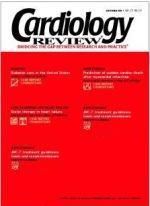Publication
Article
Cardiology Review® Online
CHF rate in type 2 diabetes is greater than previously thought
ORLANDO—The incidence of congestive heart failure (CHF) in patients with type 2 diabetes appears to be much greater than previously estimated, according to research by Gregory A. Nichols, PhD, research associate at the Center for Health Research, Kaiser Permanente Northwest, Portland, Oregon. He presented his findings at the 64th Annual Scientific Sessions of the American Diabetes Association.
A previous estimate of the CHF incidence rate in patients with type 2 diabetes was based on 30 months of follow-up from a study of members of Kaiser Permanente Northwest. The new study identified and described risk factors for developing CHF over 6 years of follow-up using the same database as the 30-month study. The study population consisted of 8,231 patients from Kaiser Permanente Northwest who were diagnosed with type 2 diabetes. These patients were compared with age- and sex-matched nondiabetic patients from the same health maintenance organization.
On average, diabetic patients who developed CHF were 5.5 years younger than the nondiabetic subjects who developed CHF (P < .001). The 6-year incidence of CHF per 1,000 person-years revealed that diabetic patients experienced CHF at a rate that was 2.5 times the rate of nondiabetic comparison subjects (30.9 versus 12.4 cases per 1,000 person-years; P < .001).
The data suggest that the incidence of CHF in patients with type 2 diabetes may be “3 to 15 times greater than previous estimates that were based on smaller samples, shorter follow-up, or more severe case definitions,” according to Dr. Nichols. Previous estimates of CHF incidence in diabetic patients ranged from 2 to 10 cases per 1,000 person-years.
CHF incidence increased steadily with age in both the diabetic and nondiabetic patients. The difference in the rates of CHF between subjects with and without diabetes decreased with increasing age. This narrowing in CHF rates with age suggests that “diabetes not only increases the risk of CHF but also accelerates its occurrence,” he said.
Compared with diabetic patients who did not develop CHF, those who did experience CHF had a longer duration of diabetes at baseline, were more likely to have ischemic heart disease, had more advanced renal disease, were more likely to be using insulin, and were more likely to be taking metformin. Glycemic control and blood pressure were statistically but not clinically significantly different between those who did and did not develop CHF.
Every 5-year increase in age increased the risk that a person with type 2 diabetes would develop CHF by 40%. The presence of ischemic heart disease more than doubled the risk of CHF. Greater body mass index and poor glycemic control were also strong predictors of more rapid development of CHF.
“Our multivariate results confirm that tight glycemic and blood pressure control, as well as weight loss and renal disease treatment,
are essential to the long-term health of people with diabetes,” said Dr. Nichols. “Given the substantially larger CHF rate ratios and the greater life expectancy of patients under age 65, younger persons may benefit most from intensive risk factor modification.”
